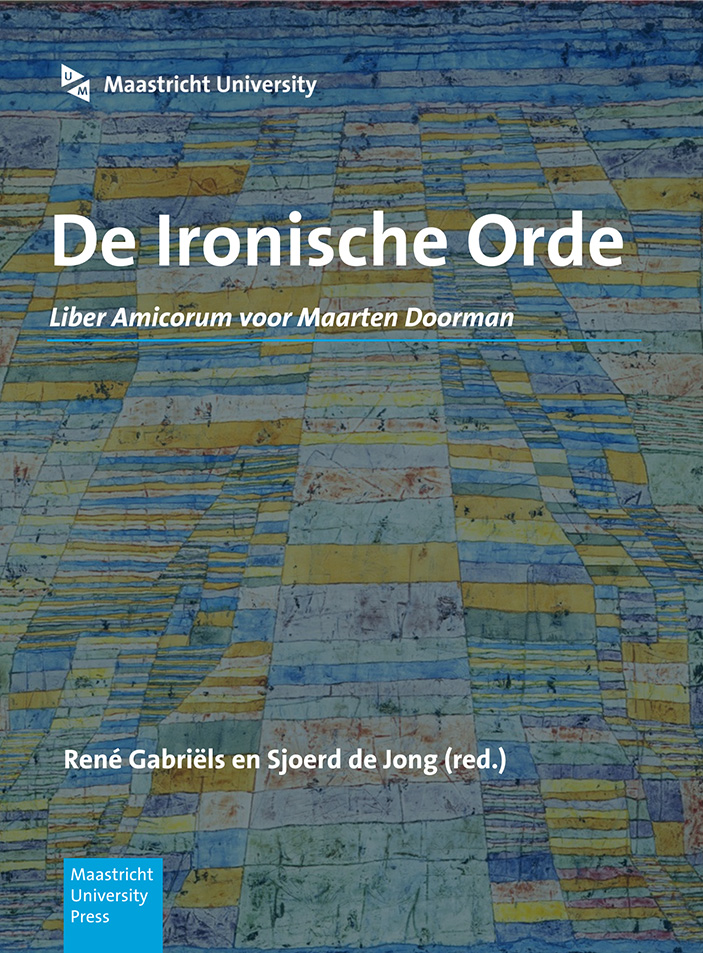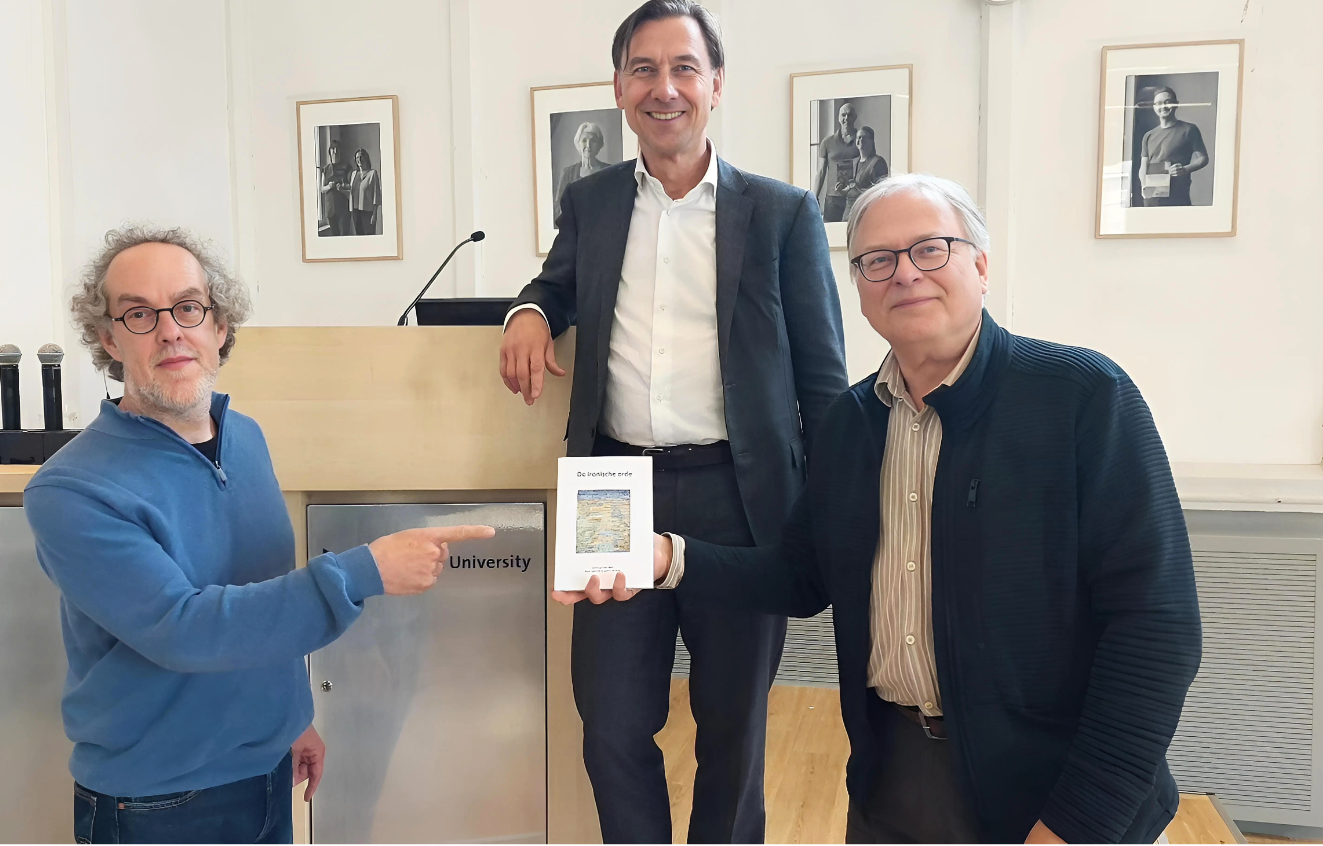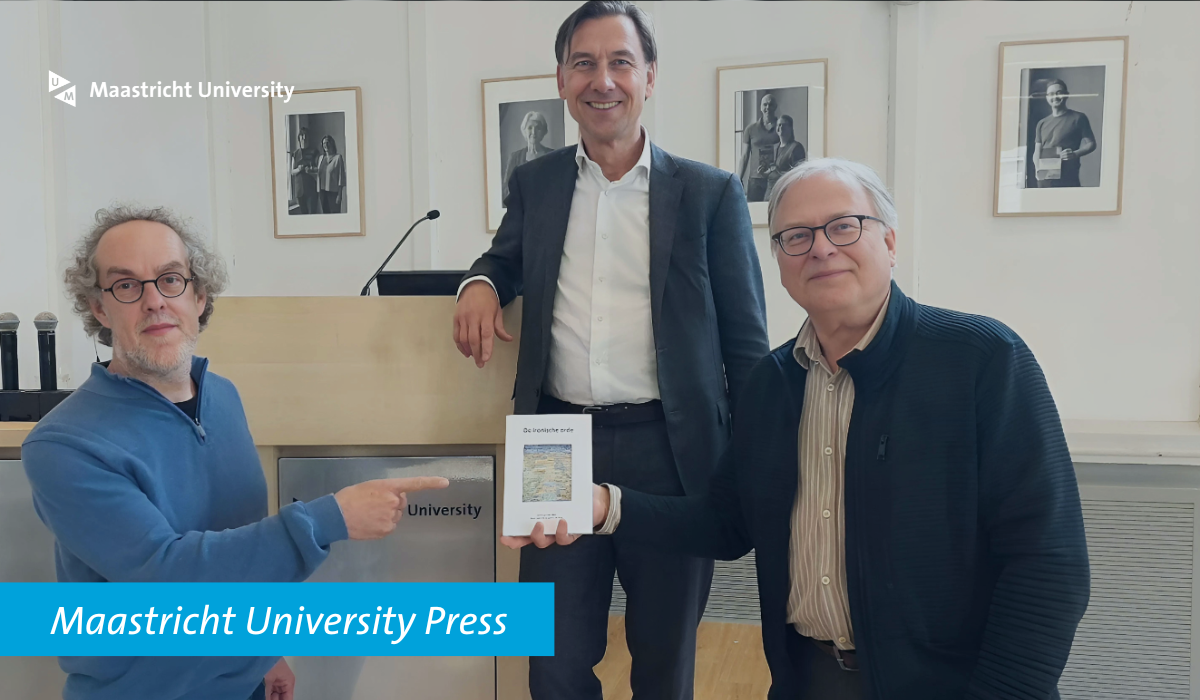Photo: René Gabriëls (l), Maarten Doorman (m) and Sjoerd de Jong (r).
They and Doorman’s colleagues, friends and acquaintances honour his contributions to philosophy and science with this book of friends they compiled together. After more than three decades of work at Maastricht University, he has now retired.
De Ironische Orde
The book’s title is not just a name but a gateway to profound reflection. René explains that De Ironische Orde references Doorman’s earlier work, De Romantische Orde.
He clarifies that romantic irony is not simply the opposite of a statement but subtly undermines it. “It is an acknowledgement of our desire for the infinite, which we can never fully attain,” he says. Every work of art, he argues, is an attempt to capture something intangible but will always fall short. “The truth can never be fully grasped, and nothing is ever definitive.” This tension between the unattainable and our human attempts to reach it forms the core of the ironic order, a theme that will stimulate your intellectual curiosity.
Open Access
An important decision in the publication of De Ironische Orde was to make the book available through open access.
René explains why this was crucial: “Scientific knowledge should be a public good, accessible to all who seek it. The best way to achieve this is through open access. We are very grateful to Maastricht University Press for the opportunity they have given us, especially as the book will also be used in education. This decision ensures that our academic community, including students, researchers, and the general public, can all benefit from the knowledge within these pages.“
Open Educational Resource
René sees a clear role for The Ironic Order in education and has specific learning objectives: “In various courses, the tension between Enlightenment and Romanticism, central to the book, will be discussed extensively. I explicitly ask students to read French, German or Dutch texts, especially when they have not yet been translated and are relevant in content.”
The choice for open access ensures that students and researchers have access to the book and a wider audience. “Now the general public can read our book too,” he adds, emphasising the importance of accessibility in disseminating knowledge.
Maastricht University Press
However, compiling the Liber Amicorum was challenging. “The production of this book was under enormous time pressure,” René explains. “There was, of course, a strict deadline due to Maarten’s farewell speech. The biggest challenge was, therefore, finishing the book on time.”
The physical copy presented in July was a quick print version, but René is proud that he could also announce the digital open-access version simultaneously. The Liber Amicorum now meets the quality standards of Maastricht University Press and can be ordered through the publisher and various Dutch (online) bookshops.
“The quality of the submitted texts is high, and the layout by the publisher has turned out beautifully,” René says contentedly. He acknowledges that the challenges would have been much more difficult without the editorial guidance of the publishing house staff. “They deserve great praise,” he says appreciatively.
Finally
René hopes that readers, both within and outside academia, will recognise the value of the tension between Enlightenment and Romanticism.
“I hope that students realise that this tension is still relevant today,” he says. “And that researchers find inspiration for their work by reading this book.” The Ironic Order aims to have a lasting impact by offering new perspectives and initiating a dialogue essential for our times.

De Ironische Orde
Liber Amicorum voor Maarten Doorman
Editors:
René Gabriëls and Sjoerd de Jong
Copyright & Creative Commons:
Open Access – CC BY 4.0 – Copyright the authors
DOI: 10.26481/mup.2401
ISBN: 9789403754352
Visit Maastricht University Press to access, read and download all versions of the book and its chapters or to order a print copy.
Thanks for reading our posts and tips about academic publishing and Open Access. If you have questions about this post or want to discuss its content, see below for all contact options of the Scholarly Communications team at Maastricht University Library.
More information
Further reading and sources:
Support and contact:
- Please use our Ask Your Librarian service for prompt answers to concrete questions and issues.
- If you have questions, ideas, or feedback, please comment below or message us at openaccess@maastrichtuniversity.nl.
- Subscribe to our monthly Research Support Update to stay informed about changes and updates.
- You can also follow our updates, engage with us and discuss this topic with our UMployee group (intranet).
- We can discuss publishing and open-access-related topics during our weekly Open Access Publishing Hour.



0 Comments